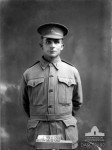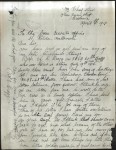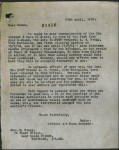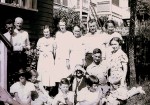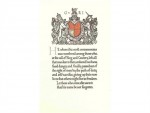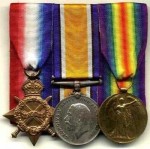BRAGG, Arthur Robert
From Susan Lawrence:
Arthur Robert BRAGG was the publican of the Central Hotel, Beaconsfield,Victoria. He was married to my great-grandmother's sister, Emily (maiden name Culverwell).
I believe Emily moved to East Melbourne after Arthur enlisted in 1915, as she was possibly not able to run the hotel by herself. My grandmother, Grace Perkins, was living with her at the time. It is possible that they moved to East Melbourne to enable Grace to find employment in the city.
Emily Bragg lived at 100 Powlett Street, East Melbourne for only a short while. She returned to Queensland about 1917, after hearing of her husband's death in France. She also lost a son, Archibald Curel, who was killed in Belgium in October, 1917. Grace remained in Victoria, as she did not like the hot weather in Queensland.
Emily (nee Culverwell) and Arthur Bragg had married in Cloncurry, Queensland in 1908, after the death of Emily's first husband. They came to Victoria with Grace in about 1913 or 1914 to run the Gippsland Hotel, Beaconsfield. (It was later renamed the Central Hotel).
Arthur Robert Bragg is commemorated on the War Memorial in Beaconsfield, and I believe is also commemorated on another War Memorial in his birthplace, Maitland, NSW.
Arthur Bragg was born in Maitland in 1876.
Service record from National Archives:
Arthur Bragg enlisted on 27 July 1915 and joined the 24th Battalion, 6th Reinforcements on 2 August 1915. Following training at Broadmeadows, his battalion embarked on HMAT Ulysses A38 on 27 Oct0ber 1915. he was taken on strength with the 6th Battalion at Tel-el-Kebir. On 3 March, 1916, he was admitted to the Field Ambulance Ferry Post at Ismalia with blistered feet. Then, on 9 April, 1916, he was taken to the 4th Field Ambulance station with rheumatism. He was also suffereing with cramps and scabies and was treated for these before he was returned to his unit.
On 15 April, he was promoted to Lance-Corporal and on 16 June embarked from Alexandria on the Kinfarns Castle to join the British Expeditionary Force in France, disembarking at Marseilles. On 27 June, he was promoted to Corporal. Fromelles was the first major action for the 60th Battalion and they were not given the benefit of experience in the 'quiet' sector, but were sent immediately to the front in what the Australian War Memorial describes as 'the worst 24 hours in Australia's history'. Of an overall 7,080 casualties at Fromelles, there were 5,533 deaths.
Arthur Bragg was reported missing in action in the field on 19 July 1916. There were no witness statements in the inquiry into his death. On that day, the 6oth battalion had 757 casualties. He is remembered at VC Corner, Australian Cemetery and Memorial, Fromelles, Lille, France. His name is recorded on Panel 169 in the Commemoration Hall of the Australian War Memorial, Canberra.
Correspondence in National Archives:
There are a series of letters from Emily Bragg, seeking information about her husband and eventually, after he was confirmed killed in action, further letters asking for mementos. (It is to be remembered, as Susan Lawrence has pointed out, that Emily also lost a son, Archibald Curel, in 1917.) The last of these letters was dated November 1922.In response to a specific question from Emily, Victoria Barracks replied that they had no record that Arthur Bragg had left a Will
Additional Notes: Emily Curel was first married to Henry Edward Curel, by whom she had two sons and a daughter, Ethel Florence. Henry Curel died after a lingering illness in October, 1907. he was remembered in The Western Champion Newspaper as ' one of the pioneers and fathers of Cloncurry ... in the early days, one of the business gods of the town'. Emily's son, Archibald Charles Curel, 3498, enlisted and was a driver with the 45th Battalion. He was killed at Passchendaele, Belgium. Her son, John Curel, enlisted with the 1st Australian Camel Corps as part of the 11th Light Horse Regiment. She also had a daughter, Ethel Florence. In 1908, Emily Curel, then proprietor of the Central Hotel, Cloncurry, married Arthur Bragg, who had been managing the hotel for her. She sold the hotel and in 1913 they moved to Beaconsfield, Victoria, where in 1914 she bought the Gippsland Central Hotel. Arthur Bragg became the proprietor and a local figure, involved in the Sporting Club and the Shooters Club and the general social life of Beaconsfield. On November, 1915, however, Emily Bragg sought a dissolution of the marriage (reported in The Truth newspaper as 'Sinful Soldier Discovered By His Spouse'). She had discovered that her husband was running up debts. In August, they had had a quarrel and he had left the house and enlisted in the Expeditionary Force. He admitted that he had been 'misconducting himself with women'. Following this, she applied to have the hotel licence transferred to herself and then, sold the hotel to a Mrs. Steele and moved to East Melbourne. She lived there for less than a year before she returned to Queensland.
Susan Lawrence: Email Jan 2013.
Australian War Memorial, Unit Histories, Roll of Honour
National Archives of Australia, Service Record
The Northern Miner 29/1/1908 p.5 Marriage of Arthur Bragg to Emily Curel
The Western Champion and General Advertiser (Barcaldine Queensland 12/10/1917 p.10 H.E.Cuvel
South Bourke and Mornington Journal 4/9/13 p.3 Arthur Bragg applies for transfer of the licence of the Gippsland Hotel to himself. 19/8/1915 p.3 Emily Bragg applies for the transfer of the hotel licence to herself
The Argus 6 May 1915 p.2 Accident to Arthur Bragg, 25/11/1915 Emily Bragg seeks dissolution of her marriage
Truth 25/11/1915 p. 7 'Sinful Soldier Divorced By His Spouse'
Ancestry.com.au Public Member Tree: Gordon Family tree, scroll, medals; photo of Emily, Matthews Family Tree
Can you help?
Can you correct or provide more information about this person?
Or are you able to help with this history project?
- Family stories and records including photos, documents and memorabilia?
- Stories or information in books, newspapers and on-line?
- Memorial plaques in churches and public places?
- War memorial, church, national and state archives?
If so, please Contact the East Melbourne Historical Society.

